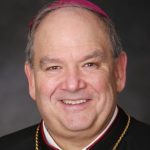On Thursday, Oct. 18, Bishop Juan Miguel Betancourt Torres, SEMV, one of two vice rectors at the St. Paul Seminary and a longtime pastor in our archdiocese, was ordained to serve as the auxiliary bishop of the Archdiocese of Hartford. He will be sorely missed at the Catholic parish Community of St. Francis de Sales and St. James here in St. Paul, as well as at the seminary and by many of our priests, particularly those whom he had formed over the past decade.

It’s not surprising, however, that Pope Francis would have chosen for this important task a biblical scholar with a pastor’s heart, grounded in a solid spirituality rooted in the charism of his religious community, capable of ministering generously in a multicultural context, and having a deep knowledge of the experience of Catholic immigrants and refugees.
As I listened to the papal nuncio, Archbishop Christophe Pierre, read the Decree of Appointment, and as I reflected on the prayers of the ordination ceremony, I was honored that Pope Francis would have looked to our archdiocese, and particularly to one of our archdiocesan seminaries, for the choice of a new successor of the apostles. It would seem to be a vote of confidence in the measures that Bishop Betancourt and his colleagues have taken in the course of the past decade to strengthen the programs offered at the St. Paul Seminary to meet the needs of the Church.
On the same day as Bishop Betancourt’s ordination, the Washington Post ran an op-ed by Rev. Thomas V. Berg titled “Want to address priest sexual abuse? The Catholic Church needs to overhaul its seminaries.” Given that he is a professor of moral theology and vice rector of St. Joseph’s Seminary in the Archdiocese of New York, Father Berg’s critique is supported by solid credentials. I came to know of him and his work through the kindness of a number of survivors of clergy abuse here in the Twin Cities who see Father Berg as a very credible advocate for the sorts of change that survivors see as crucial to rebuilding our Church.
I was encouraged that many of the suggestions offered by Father Berg are already being implemented by our two archdiocesan seminaries. He noted a need for seminary programs that go beyond “an overemphasis on academics” to “forming candidates who are emotionally mature and have a healthy, well-integrated personality and spirituality” and recognized that seminaries need to foster “an inner culture of trust, transparency and honest dialogue.” Thankfully, those needs have already been priorities for several years at both of our seminaries, as reflected in the priority that they have given to human formation (while maintaining the high academic standards that sending bishops find so essential).
We see that, for example, in the hiring of a full-time psychologist at the St. Paul Seminary to assist with human formation and the fostering of a culture of trust. Both seminaries, moreover, have invested in the continuing education of their staffs, taking advantage of the resources of the Institute for Priestly Formation (in the area of spiritual formation) and the Seminary Formation Council (for formation advisors and mentors).
Father Berg also calls for a “blue ribbon panel of seasoned seminary formators” to conduct a visitation of American seminaries, and he speculates that there should be some consolidation among seminaries to make certain we are pooling the resources of the best formators, those who are capable of offering the formation that our challenging contemporary context requires. The executive committee of our seminary board has already been working with our rectors to explore options for how a meaningful evaluation or visitation could take place. I have been consistently impressed by their openness to critique.
Just last year, the board conducted a study that collected the insights, opinions and suggestions of bishops who send students to our seminaries, of the bishops of our region, and of faculty and staff members and recent graduates. There’s a real commitment to improvement, always with the hope of producing happy, healthy and holy priests and lay ministers capable of meeting today’s pastoral challenges.
I recently had the opportunity to meet with the parents of our archdiocesan seminarians, along with both rectors and our archdiocesan vocation director. There was very consistent and reassuring feedback from the parents that their sons were confronting the recent scandals and challenges “with eyes wide open,” responding to the present crises by renewing their commitment to vigorous discernment and priestly formation, knowing that the Church needs leaders after the heart of Christ who will be outstanding in virtue.
I hope that you will make the effort to get to know our seminarians, to welcome them into your parishes, and to get involved in the “teaching parish programs” that provide needed lay feedback and context for our future shepherds. They are a great source of hope for all committed to the rebuilding of our Church.
Please join me in praying as well that the Lord will help us identify, train and support more formators with the gifts that Bishop Betancourt brought to the St. Paul Seminary. May the Lord bless him in his new ministries and continue to bless all involved in the important work of seminary formation.



